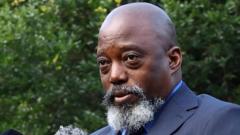The Democratic Republic of Congo's Senate has voted to strip Joseph Kabila, the former president, of his immunity, leading to potential treason charges against him. Accusations of Kabila's support for the M23 rebel group have emerged, though he denies these claims. Amid ongoing conflict, his prosecution raises concerns about stability in the region.
DR Congo Authorizes Prosecution of Former President Kabila for Treason

DR Congo Authorizes Prosecution of Former President Kabila for Treason
The Senate of the Democratic Republic of Congo has removed the legal immunity of former President Joseph Kabila, allowing charges of treason to proceed amid accusations of his involvement with rebel groups in the eastern region.
The Democratic Republic of Congo's Senate has voted to remove former President Joseph Kabila's immunity, enabling his prosecution over allegations of treason related to his purported support for the M23 rebel group in the eastern part of the country. Authorities claim there is a "substantial body of documents, testimony, and material facts" connecting Kabila to this armed faction, which has captured various towns in a region rich in minerals.
Kabila, who served as president from 2001 until 2019, has not issued a public response to the charges but has historically denied any ties to the insurgents. Following a Senate vote in which 90 senators supported the removal of Kabila’s immunity, Senate Speaker Jean-Michel Sama Lukonde announced, "The senate authorizes the prosecution and lifting of Joseph Kabila's immunity.” Notably, Kabila did not appear to defend himself at the Senate session.
After leaving office, Kabila was granted the status of "senator for life," conferring upon him legal immunity, but military prosecutors petitioned the Senate to lift this privilege in light of the treason investigation. For the past two years, Kabila has resided in South Africa, although he recently expressed intentions to return to the DRC to assist in resolving the ongoing conflict in the east. Reports surfaced indicating that he might have returned to Goma, a city recently under M23 control, but these were denied by his political party, the People's Party for Reconstruction and Democracy (PPRD).
The situation escalated when Justice Minister Mutamba ordered Kabila's assets to be seized and urged him to return to face justice and defend himself. Analysts warn that Kabila's trial could exacerbate tensions in a nation already grappling with M23 insurgency since 2012. His party has criticized the prosecution, labeling it a distraction from significant national issues.
Kabila rose to power at age 29 following the assassination of his father, Laurent Kabila, and his relationship with current President Félix Tshisekedi, with whom he initially allied in governance, has since soured. The continuous armed struggle between M23 and the Congolese military, along with allied militias, raises concern for the humanitarian situation as hundreds of thousands are displaced.
In parallel developments, discussions between DR Congo and Rwanda, which denies backing M23, indicate a potential peace agreement to quell the violence. A preliminary accord was signed last month in Washington, leading to hope for an eventual resolution. Meanwhile, three M23 leaders were sentenced to death in absentia last year, marking a tough stance by the military courts against the rebels. The DRC government also announced a reward for information leading to their capture, highlighting the urgency of the situation.





















